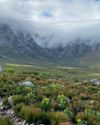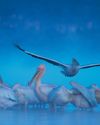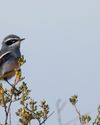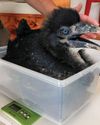
Geographic landmarks include the snow-capped 5190-metre Rwenzori (aka the legendary Mountains of the Moon), the immense inland sea known as Lake Victoria and the associated source of the Nile, and the spectacular volcanic cones of the Virungas. A network of 10 national parks protects not only the gorillas for which Uganda is renowned, but also plentiful chimpanzees, more than a dozen monkey species, the tree-climbing lions of Ishasha and significant numbers of elephants, hippos, buffaloes and various antelope.
Uganda can also stake a fair claim to being Africa’s best all-round birding destination. This is largely due to its extraordinary avian diversity – a mind-boggling 1075 species in an area similar to that of Great Britain – but also because it offers easy access to several bird-rich habitats difficult to reach elsewhere on the continent. True, Uganda’s transitional location means that it boasts just one or possibly two national endemics (Fox’s Weaver, associated with waterside vegetation in the south-east, and Rwenzori Double-collared Sunbird, an Albertine Rift endemic whose range might now be limited to the Ugandan slopes of the Rwenzori). But in the broader East African context, approximately 150 bird species (more than 10 per cent of the regional checklist) have a range restricted to Uganda, a list that includes dozens of Albertine Riftor Guinea–Congo endemics whose range is otherwise confined to parts of the Congo that might generously be described as difficult to access.
BEST POST-FLIGHT PICK-UP
Entebbe Botanical Garden
Esta historia es de la edición January - February 2020 de African Birdlife.
Comience su prueba gratuita de Magzter GOLD de 7 días para acceder a miles de historias premium seleccionadas y a más de 9,000 revistas y periódicos.
Ya eres suscriptor ? Conectar
Esta historia es de la edición January - February 2020 de African Birdlife.
Comience su prueba gratuita de Magzter GOLD de 7 días para acceder a miles de historias premium seleccionadas y a más de 9,000 revistas y periódicos.
Ya eres suscriptor? Conectar

EXPLORING NEW HORIZONS
Keith Barnes, co-author of the new Field Guide to Birds of Greater Southern Africa, chats about the long-neglected birding regions just north of the Kunene and Zambezi, getting back to watching birds and the vulture that changed his life.

footloose IN FYNBOS
The Walker Bay Diversity Trail is a leisurely hike with a multitude of flowers, feathers and flavours along the way.

Living forwards
How photographing birds helps me face adversity

CAPE crusade
The Cape Bird Club/City of Cape Town Birding Big Year Challenge

water & WINGS
WATER IS LIFE. As wildlife photographer Greg du Toit knows better than most.

winter wanderer
as summer becomes a memory in the south, the skies are a little quieter as the migrants have returned to the warming north. But one bird endemic to the southern African region takes its own little winter journey.

when perfect isn't enough
Egg signatures and forgeries in the cuckoo-drongo arms race

Southern SIGHTINGS
The late summer period naturally started quietening down after the midsummer excitement, but there were still some classy rarities on offer for birders all over the subregion. As always, none of the records included here have been adjudicated by any of the subregion's Rarities Committees.

flood impact on wetland birds
One of the features of a warming planet is increasingly erratic rainfall; years of drought followed by devastating floods. Fortunately, many waterbirds are pre-adapted to cope with such extremes, especially in southern Africa where they have evolved to exploit episodic rainfall events in semi-arid and arid regions. But how do waterbirds respond to floods in areas where rainfall - and access to water - is more predictable? Peter Ryan explores the consequences of recent floods on the birds of the Western Cape's Olifants River valley.

a star is born
It’s every producer’s dream to plan a wildlife television series and pick the right characters before filming.